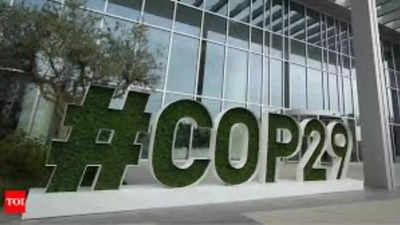
BAKU: Negotiations at the UN climate summit went into overtime as the presidency texts landed on Friday, scheduled as the concluding day of COP29, carried huge gaps on climate finance issues that need to be bridged for a final outcome.
The biggest point of disagreement is the meager core goal of $250 billion per year, which the developed countries are expected to mobilise for developing countries from a “wide variety of sources,” including public, private, bilateral, and multilateral, by 2035, rather than only from public finance.
Though the annual $250 billion is part of the overall figure of “at least $1.3 trillion per year by 2035” from “all public and private sources,” developing countries outrightly rejected it as they have long been pitching for a bigger share of public finance (grants and grant-equivalent resources) from the developed countries in the overall package. The post-2025 annual $250 billion by 2035 in the text is meant to replace the existing goal of $100 billion per year.
Besides the quantum and nature of finance, the other point of discord is the provision where even the developing countries are expected to make additional contributions, including through South–South cooperation, to supplement the finance goal. It is now to be seen how long the negotiators from both developed and developing countries take to thrash out their differences and find a landing zone to reach a final outcome at the annual summit.
“The $1.3 trillion number is at best a sham. Even the apparent increase in the provision from the developed world to the developing world of $250 billion annually by 2035 is the same as the $100 billion by 2020 if 6% annual average inflation is accounted for. There is no grant or low-cost finance component. This is a bad deal for the developing world, irrespective of how it is going to be portrayed by the presidency,” said Vaibhav Chaturvedi, Senior Fellow, Council on Energy, Environment and Water (CEEW).
Avinash Persaud, Special Advisor on Climate Change to the President of the Inter-American Development Bank, however, said, “There is no deal to come out of Baku that will not leave a bad taste in everyone’s mouth, but we are within sight of a landing zone for the first time all year. The recognition of needs on the text is vital to give integrity to the system, but the $250bn commitment to be led by developed countries is short given adaptation needs alone, and reliance on the hope and prayer of cross-border private sector flows that have so far been negligible will be a point of contention.”
Aarti Khosla, Director, Climate Trends, noted that the latest text even changed goalposts as it calls on all countries, developed and developing, to contribute towards climate finance. “It offers no core amount, which is necessary, not just to fight climate change, but to deliver on the legal obligations of the developed world. Setting a trend of acting in bad faith and cornering developing nations is dangerous. Watering down ambition on all fronts is a setback to the process itself but also to what multilateralism can yield,” she said.
“The sum proposed in the most recent NCQG text is just 0.22% of world GDP. The amount is expected to come through loans, mostly from MDBs, not grants, therefore effectively paid by borrowers. Developed countries allocate significantly more resources annually—up to 10 to 20 times as much—on other global priorities like defence. This shows how incredibly short-sighted and narrow we can be—especially towards the planet and risks for coming generations when the scale and frequency of impacts are already evident,” said Dipak Dasgupta, Distinguished Fellow, TERI.
